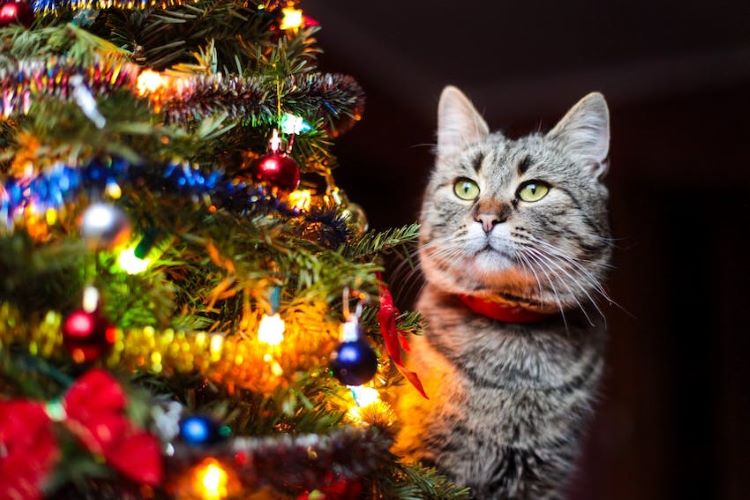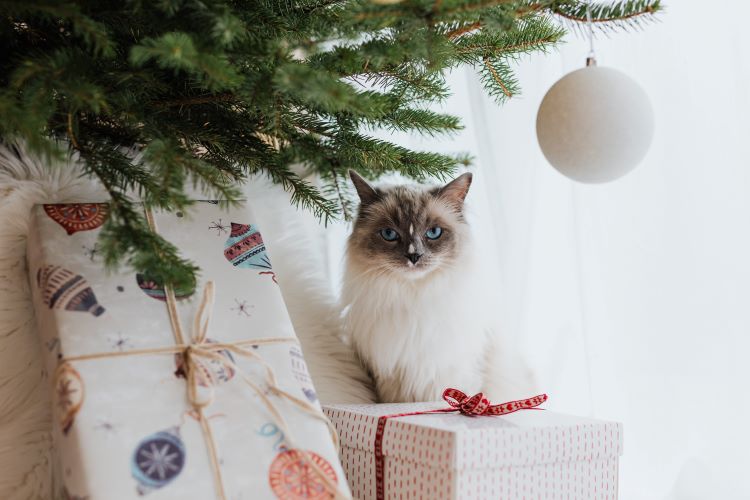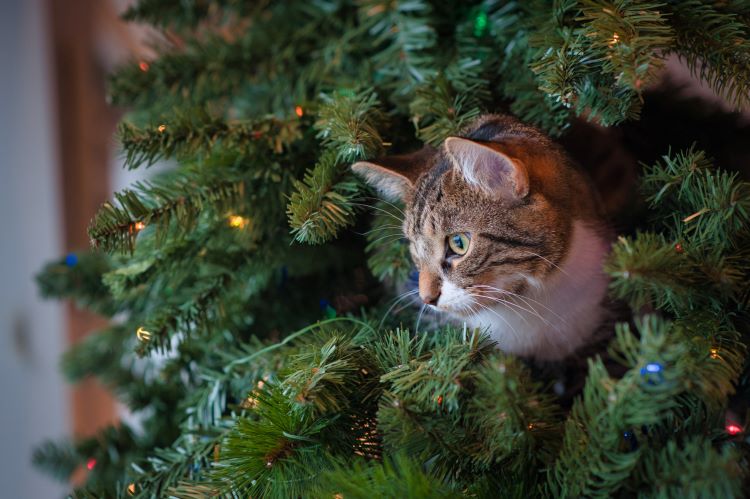Ready to help treat your pet to a healthy life?
Easy Ways to Cat-Proof Your Christmas Tree
By : Brianna Gunter & Trupanion Staff | Updated Nov 13, 2025

The tree’s all lit and glittering with ornaments… for about five seconds. Once your cat spots a shiny and dangly ornament, it’s only a matter of time before your Christmas tree goes from dazzling to destroyed.
Sound familiar? Cats attacking and climbing Christmas trees is incredibly common. While not all kitty parents deal with totally demolished Christmas trees every holiday season, many of us have at least lost an ornament (or three) to feline paws. Even more concerning, pine needles and the pesticides used on Christmas trees can give your cat an upset stomach.
Fortunately, there are things you can do about it. You don’t need to forgo having a tree this year, and you’re not doomed to weeks of cleaning up broken ornaments and branches in disarray. In addition to making sure your feline is protected ahead of time against surprise accidents and illnesses, there are several steps you can take to cat-proof your Christmas tree and ensure the holidays are merry for human and feline alike.
5 tips to keep cats away from Christmas trees
For many cat parents celebrating the holidays, a tree with ornaments is essential December décor. Follow these tips to keep your Christmas tree safe from your cat’s curiosity.
1. Choose your tree location carefully
First things first, choose wisely when it comes to the location of your tree. If you want to prevent your cat from climbing the Christmas tree, you’ll need to make sure it’s a decent distance from any “jumping points” like furniture and shelves. Think about your cat’s usual climbing behavior and where they like to go. If you’re struggling to find the best place for your Christmas tree, it could mean you’ll have to rearrange some things.
Wherever you do set your tree up, make sure you’re using a strong, sturdy base. For the most security, use a Christmas tree stand that sits flat against the ground and can be weighted down. Your tree should never wobble or topple easily. While a falling tree may quickly stop a Christmas tree-climbing cat in their tracks, it could also hurt them in the process.
2. Cat-proof your Christmas tree with citrus
Citrus is a well-known feline deterrent that can be used to keep your cat away from your Christmas tree. Cats are known to dislike the taste and scent, so a citrus spray can act as a powerful deterrent when sprayed on and around the base of the tree.
While many pet stores sell citrus chew and scratch repellent sprays for cats, you can also make your own lemon or orange oil cat spray at home.
In addition to sprays, a popular method is stringing up actual citrus peel or rind around the lower tree branches or placing it around the base. While most cats are likely to avoid it, this method is not recommended because eating citrus peels may cause gastrointestinal upset in cats.
3. Get strategic with decorations
One of the easiest — and most important — tips for cat-proofing your Christmas tree is to place your decorations carefully. Less important ornaments should be placed lower, while more important or valuable ones should be fastened securely higher up. None should be placed within immediate paw’s reach of your cat.
Likewise, you may want to consider removing your favorite ornaments from the tree altogether if they’re fragile. Instead, you can display them on shelves or another out-of-the-way location.
While it may look a bit silly at first to have a tree that’s a bit sparse on the bottom, it’s far better than a Christmas tree under constant cat attack.

4. Consider a fake tree
Fresh-cut pine trees smell nice, but some cats — especially those who like to climb — just can’t resist the fact that there’s a real tree standing in the living room. If other steps have failed to keep kitty’s paws away (or you’re just tired of sweeping up all those needles), a fake Christmas tree could be the way to go.
Keep in mind though that an artificial Christmas tree isn’t always an instant fix, and it doesn't automatically prevent a cat from climbing the tree. While the non-living branches are certainly less likely to draw your cat’s attention, dangling ornaments or garlands can still be very enticing on its own. To make sure your tree is really safe from curious felines, be sure to take additional steps like moving ornaments higher up and placing orange peels at the base.
And hey, if your cat keeps attacking or climbing your Christmas tree — real or fake — you can always go for something a little more outside of the box. Try a tree cutout design for the wall, or consider hanging a tree from the ceiling out of reach. There are a lot of creative, non-traditional Christmas tree options that can be easily placed out of kitty’s reach.
5. Distract your cat
Even after you’ve confidently cat-proofed your Christmas tree, you’ll want to keep a close eye on your furry family member. This is a busy time of year, and you may find yourself giving them less attention than usual. Try to play with your cat multiple times a day, and give them attention frequently. You’ll also want to keep up with their regular meal and treat routine to help discourage snacking on the Christmas tree.
Now’s also a good time to give your cat a new toy or scratching post of their own. Doing so will help distract them further from the other new things in the house (like your Christmas tree) and keep them engaged in a positive enrichment activity. ‘Tis the season for giving, after all.
Need more things around the home to keep kitty occupied? Put together some quick DIY cat toys that won't break the bank (they also make great holiday pet gifts!).

Keep your Christmas tree safe for your cat
As frustrating as cats attacking Christmas trees can be, it’s important to know that it can be dangerous for kitty. Broken ornaments can result in small ceramic or glass shards that can hurt their insides if they eat it. Cats eating tinsel can likewise cause serious damage to their digestive blockages. If you suspect your cat has consumed a piece of an ornament or other part of your Christmas tree, be sure to seek medical attention right away.
You should also take precautions to prevent your cat from chewing on the branches or drinking water out of the Christmas tree base, as pine resin can be harmful to cats. Likewise, be sure to consult with your pet’s veterinarian first before using any scents or sprays as a deterrent. In addition to some cats have allergies to certain organic materials, there are a variety of things we enjoy as humans that can be harmful to felines. For example, essential oils can be dangerous for cats and should never be used on your Christmas tree.
In fact, it’s always a good idea to call up your veterinary office with any questions about what kinds of holiday décor may be hazardous to kitty’s health. All the more reason to cat-proof your Christmas tree.
Take some time now to learn more about pet holiday safety and protect your pal all season!
